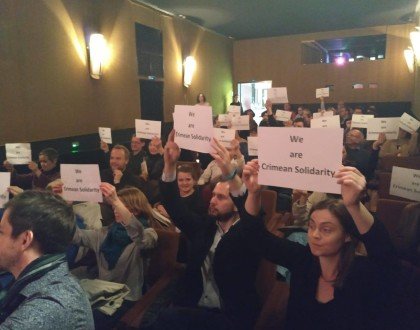How Russian ‘law enforcers’ humiliate their Muslim prisoners in Crimea
The relatives of political prisoners united in the Crimean Solidarity movement have discussed the disgraceful and humiliating treatment of the defendants in the ‘Crimean Muslim case’ by Russian security officers.

Remand jail of Simferopol, the capital of Russian-occupied Crimea
This has been reported by Anna Bogacheva, the wife of the Kremlin’s hostage Vadym Siruk.
Recently the five arrested were transported from the prison in occupied Simferopol to the FSB investigator in a way that bore obvious signs of torture. They were kept faces down on the floor of a bus, with bags on their heads, handcuffed with hands behind their backs. Moreover, the guards dragged the legs of th prisoners to get them ‘extracted’ from the bus (!)
Then, on the way to the investigator’s office, the Crimean Muslims were escorted like those sentenced to life imprisonment. At least some of them were kicked by the guards.
According to Liana Dzhemadenova, the wife of the Crimean hostage Emil Dzhemadenov, most political prisoners of the Simferopol remand jail suffer from acute conditions of chronic deceases. Almost all of them have dental problems (caries, pulpitis, periodontitis, and one has “no enamel on his teeth”).
On October 12, 2016, the FSB proudly reported that it had arrested the local ‘leaders’ of the allegedly ‘terrorist organization’ Hizb ut-Tahrir in Crimea. The captured Muslim Teymur Abdullaev was immediately charged under the first part of Article 205.5 of the Russian Criminal Code (‘organization of a terrorist community,’ which means up to 20 years in jail). Four other men: Ayder Saledinov, Emil Dzhemadenov, Teymur’s brother Uzair Abdullaev, and Rustem Ismailov were incriminated under the second part of the same article (‘participation in a terrorist community’). The sole piece of ‘evidence’ of their alleged ‘guilt’ was Islamic literature found during the searches of their houses.
Those five were by far not the first victims of the framed up ‘Hizb ut-Tahrir case’. Four defendants had been sentenced to jail (5 to 7 years) in Russia in September 2016, and eight others have been waiting for trial behind bars in Simferopol.



